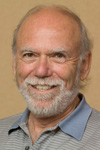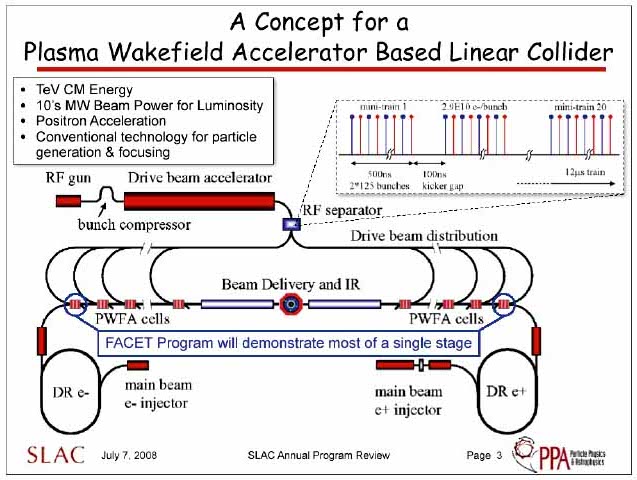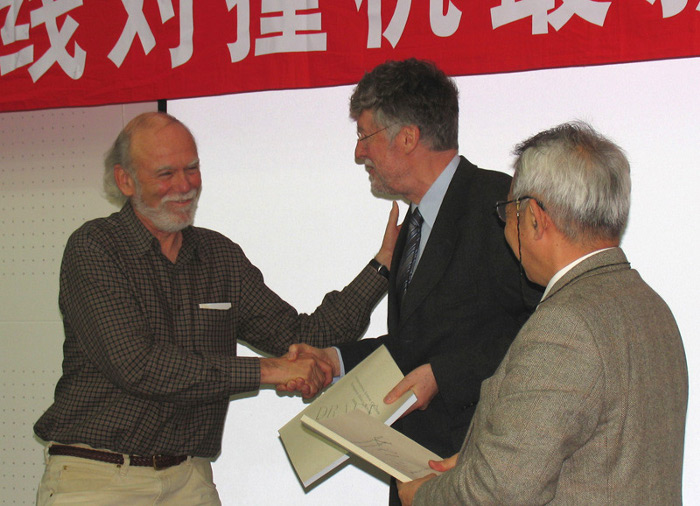Director's Corner
4 December 2008
 Barry Barish |
Discussing the future — SLAC ICFA Seminar
Visionary thinkers converged at SLAC for an ICFA Seminar (International Committee for Future Accelerators) on possible future projects for particle physics during the last week in October. This was the ninth such ICFA-sponsored seminar, held every three years with the expressed aim of bringing together government officials and representatives of the major funding agencies, the directors of major high-energy physics laboratories, and leading scientists from the worldwide high-energy community to discuss ideas and plans for future initiatives. The meeting brimmed with ideas, and included presentations varying from plans for future neutrino experiments to the prospects for advanced acceleration techniques.
ICFA is a working group of the International Union of Pure and Applied Physics (IUPAP), the international organisation of physicists that sponsors our international high energy physics conferences. It was ICFA and its subcommittee, the International Linear Collider Steering Committee (ILCSC), that conceived of and formed our Global Design Effort (GDE), following the decision to base the technology on superconducting radiofrequency cavities. The ICFA Seminars have provided an opportunity for the exchange of ideas on the future direction of accelerator-based high-energy physics with emphasis on globalisation issues. At this year's seminar, the scope was expanded beyond accelerator-based projects to incorporate other major initiatives in the field, including plans for the proposed new underground laboratory DUSEL (Deep Underground Science and Engineering Laboratory) in the US.
The most futuristic ideas relevant to our own work towards a linear collider to complement results from the Large Hadron Collider LHC at CERN were those involving advances in plasma wakefield acceleration, future R&D plans and even a concept for how a linear collider could be conceived that used these techniques. Plasma acceleration techniques use the electric field associated with an electron plasma wave to accelerate the particles. Chan Joshi describes the technology in his ICFA Seminar talk. Plasma wakefield acceleration potentially offers a path to a new era of particle accelerators that could be much smaller than conventional devices. Very high gradients could be achieved because the accelerator is not limited by material properties like radiofrequency acceleration. In recent tests at SLAC, they achieved a doubling of the SLAC beam energy from 42 GeV to 85 GeV for a few percent of the beam in a one-metre acceleration track. Of course there are many problems that must be solved before plasma accelerator techniques could be used for an actual high-energy particle accelerator, but it is crucial to support this type of research with its large potential for the long-term future of accelerator-based particle physics.
Of more immediate concern for our linear collider goals of developing a strong proposal for a construction project, on the time-scale of LHC results, is the joint work we can do with other projects, for example CLIC, the European XFEL and Project X. At the ICFA seminar we heard from Giorgio Apollinari of Fermilab about preliminary planning and R&D objectives for Project X at Fermilab, and he mentioned areas of synergy and potential collaboration with ILC. Follow up discussions are underway and I will report on these as plans become more definite.
Finally, today I would like to acknowledge that this ICFA Seminar was the final meeting for Albrecht Wagner as chair of ICFA. In his opening talk, Albrecht stressed that particle physics is at a crossroads, the importance of pushing the frontier to the 1-TeV scale and ICFA's role in promoting the LHC and steering the development of the ILC. He also pointed to the continuing central role of high-energy physics to drive accelerator development and to the expanded scope of ICFA in including neutrino physics and other non-accelerator initiatives. Albrecht has been a very strong supporter of our GDE efforts, both with the broader communities and in helping guide our efforts.
Thanks, Albrecht! We will miss you.
-- Barry Barish

